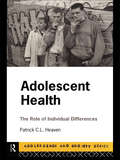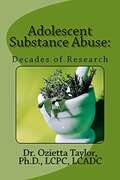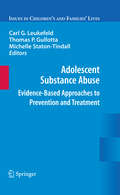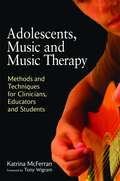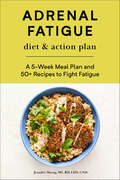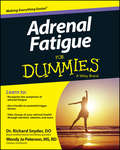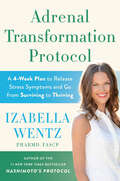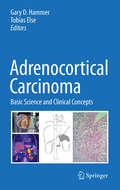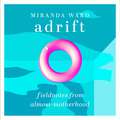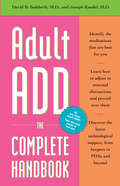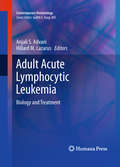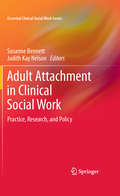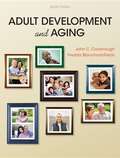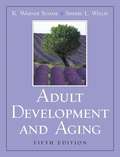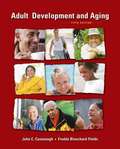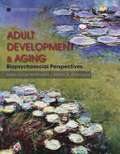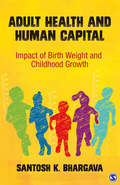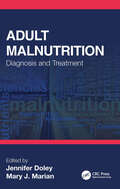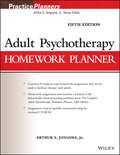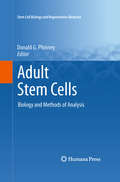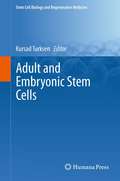- Table View
- List View
Adolescent Health: The Role of Individual Differences (Adolescence and Society)
by Patrick HeavenAdolescence is one of the most turbulent yet exciting phases in life. Increased autonomy brings with it new health risks ranging from drugs and sexually transmitted disease, to eating disorders and suicidal depression. Even though todays teenagers are more concerned with and educated about their health than any previous generation, they still engage in risky behaviour. Adolescent Health explores how individual differences contribute to health and illness across a wide range of cultures and socio-economic backgrounds. Patrick Heaven blends the latest research findings from a range of sources with practical suggestions on how to improve health care services for adolescents. Adolescent Health will prove valuable to professionals working with young people, social science students and parents.
Adolescent Risk And Vulnerability: Concepts And Measurement
by Institute of Medicine National Research CouncilAdolescents obviously do not always act in ways that serve their own best interests, even as defined by them. Sometimes their perception of their own risks, even of survival to adulthood, is larger than the reality; in other cases, they underestimate the risks of particular actions or behaviors. It is possible, indeed likely, that some adolescents engage in risky behaviors because of a perception of invulnerability—the current conventional wisdom of adults' views of adolescent behavior. Others, however, take risks because they feel vulnerable to a point approaching hopelessness. In either case, these perceptions can prompt adolescents to make poor decisions that can put them at risk and leave them vulnerable to physical or psychological harm that may have a negative impact on their long-term health and viability. A small planning group was formed to develop a workshop on reconceptualizing adolescent risk and vulnerability. With funding from Carnegie Corporation of New York, the Workshop on Adolescent Risk and Vulnerability: Setting Priorities took place on March 13, 2001, in Washington, DC. The workshop's goal was to put into perspective the total burden of vulnerability that adolescents face, taking advantage of the growing societal concern for adolescents, the need to set priorities for meeting adolescents' needs, and the opportunity to apply decision-making perspectives to this critical area. This report summarizes the workshop.
Adolescent Substance Abuse: Decades Of Research
by Ozietta TaylorMany contemporary adolescents believe that medication received from a physician office or hospital is not addicting; yet, many are becoming addicted to substances that are found in their home medicine cabinets. Research indicates that some adolescents are at risk of developing a substance use disorder. Therefore, this book alerts the reader to the hazards of adolescent substance abuse-its trends and treatment
Adolescent Substance Abuse: Evidence-Based Approaches to Prevention and Treatment (Issues in Children's and Families' Lives #9)
by Michelle Staton-Tindall Thomas P. Gullotta Carl LeukefeldSubstance abuse is, and has always been, an indisputable fact of life. People - especially young people - abuse various legal and illegal substances for any number of reasons: to intensify feelings, to achieve deeper consciousness, to escape reality, to self-medicate. And as substance-abusing teenagers mature, they pose particular challenges to the professionals charged with keeping them clean and sober and helping them maintain recovery into adulthood. Adolescent Substance Abuse: Evidence-Based Approaches to Prevention and Treatment offers clear, interdisciplinary guidance that grounds readers in the many contexts - developmental, genetic, social, and familial among them - crucial to creating effective interventions and prevention methods. Its contributors examine current findings regarding popularly used therapies, including psychopharmacology, residential treatment, school- and community-based programs, group homes, and specific forms of individual, family, and group therapy. Accessible to a wide professional audience, this volume: (1) Presents evidence-based support for the treatment decision-making process by identifying interventions that work, might work, and don't work. (2) Identifies individual traits associated with susceptibility to substance abuse and addiction in youth. (3) Provides a biogenetic model of the effects of drugs on the brain (and refines the concept of gateway drugs). (4) Evaluates the effectiveness of prevention programs in school and community settings. (5) Adds historical, spiritual, and legal perspectives on substance use and misuse. (6) Includes the bonus resource, the Community Prevention Handbook on Adolescent Substance Abuse and Treatment. This volume is an all-in-one reference for counseling professionals and clinicians working with youth and families as well as program developers in state and local agencies and graduate students in counseling and prevention.
Adolescents, Music and Music Therapy
by Katrina McferranWhen guided effectively, the relationship between adolescents and music can offer powerful opportunities for expression and release. This book provides music therapists with the complete 'how to' of working with teenage clients. Helpful and accessible, the book explains the methodology used in music therapy, a topic that has been considered only briefly until now. The author presents an empowering approach to practice, discussing how the therapist can be placed in a collaborative relationship with the individual or with the group. A range of strategies is explored, including song sharing, improvisation, song writing and various multi-media approaches. Some of the key challenges faced by music therapists working with adolescent clients are addressed, including the constantly changing repertoire and evolving musical tastes, and the author offers practical solutions for overcoming these. Contemporary models of Community Music Therapy are outlined in the second half of the book, and case vignettes illustrate how each of the methods can be applied in practice, and the outcomes that may be expected. The first of its kind, this comprehensive book is a must for all music therapists working with adolescent clients.
Adrenal Fatigue Diet & Action Plan: A 5-Week Meal Plan and 50+ Recipes to Fight Fatigue
by Jennifer Maeng5 Weeks to a better, healthier you—a practical meal plan for managing adrenal fatigueWhen you're suffering the effects of adrenal fatigue, the way you eat can change the way you feel. Filled with handy advice and delicious recipes, the Adrenal Fatigue Diet & Action Plan delivers easy ways to improve your health and find relief.This practical action plan provides a complete overview of adrenal fatigue, including what it is, potential symptoms, and other healthcare management strategies. Start your new diet off with a weeklong primer that helps you mentally prepare before diving into a 5-week meal plan, complete with tips for dealing with dietary restrictions, handling flare-ups, and navigating eating out.The Adrenal Fatigue Diet & Action Plan includes:5-week plan—Transition your diet with a fully loaded plan that helps you with mental preparation, shopping, food prep, cooking, and more.50+ recipes—Get a variety of tasty, easy recipes designed to reset your energy and keep you satiated at every meal.Highly customizable—Recipes detail what symptoms they help with, as well as important dietary information and substitution options.Get the delicious, day-by-day guidance you need to find relief from the symptoms of adrenal fatigue.
Adrenal Fatigue For Dummies
by Wendy Jo Peterson Richard SnyderThe easy way to take charge of your adrenal health Despite their small size, the adrenal glands play an important role in the body, producing numerous hormones that impact our development and growth, affect our ability to deal with stress, and help to regulate kidney function. In Adrenal Fatigue For Dummies, you'll find clear self-evaluations and treatment guidelines that will empower you to take charge of your adrenal health through nutrition, vitamins, herbs, bioidentical adrenal hormone supplementation, and self-care practices.Adrenal fatigue is in essence a "tired out" adrenal gland that is not able to support the body the way that it should. The effects can be far-reaching and affect the quality of one's daily life. It can affect the immune system, cause inflammation, decrease sex drive, and inhibit the ability to get up in the morning. But now there's hope!The 4-1-1 on the structure and function of the adrenal glandLinking inflammation and adrenal fatigueConnecting food allergy and adrenal issuesHow to test for adrenal fatigueInformation on eating patterns for all-day energy and improved concentrationDealing with other medical conditions and adrenal fatigueRelaxation tips to reduce stressAdrenal Fatigue For Dummies helps those suffering from this debilitating illness reclaim their lives by addressing the delicate balance among the adrenal glands--which can make the day-to-day difference between feeling awful and feeling good.
Adrenal Transformation Protocol: A 4-Week Plan to Release Stress Symptoms and Go from Surviving to Thriving
by Izabella WentzA recovery plan to heal and reverse adrenal dysfunction, from the #1 New York Times bestselling author of Hashimoto&’s Protocol. What were you doing in your life before you got sick? This is a common question Dr. Izabella Wentz asks her functional medicine clients when trying to get to the root cause of symptoms ranging from low energy, to dependency on caffeine, to sleeplessness and poor memory. More often than not, she finds these individuals developed their symptoms after a period of acute or chronic stress: starting a new business, having a baby, living though a global pandemic—these can all destroy our once-resilient stress response. Since her own diagnosis of Hashimoto&’s thyroiditis at the age of twenty-seven and subsequent bestselling books, Dr. Wentz has become known for her passion to translate emerging research in order to help patients eliminate symptoms conventional medicine has failed to address or even acknowledge. With Adrenal Transformation Protocol, Dr. Wentz tackles adrenal dysfunction, or the body&’s inability to produce essential hormones when it mismanages stress. While adrenal dysfunction produces a constellation of ailments, the good news is that turning these around does not have to be complicated. When we start supporting the adrenals—making a few small dietary and lifestyle changes and taking the right supplements—we can produce profound improvements within weeks or even days. With a simple 4-week program to help identify your adrenal triggers, balance your stress response, and gradually build up your resilience to prevent excess stress from overwhelming your adrenals in the future, The Adrenal Transformation Protocol will set you up with a strong foundation to return to and stay in homeostasis through turbulence.
Adrenocortical Carcinoma: Basic Science and Clinical Concepts
by Gary D. Hammer Tobias ElseWe anticipate the book to be a definitive text on the subject that explores all aspects of the study of adrenal cancer and the treatment of patients with the disease. Chapters will cover epidemiology, pathogenesis, genetics, cancer stem cells, historic and emerging therapies, mouse models of adrenal cancer, new developments in tumor profiling, worldwide collaborative groups and tumor registries together with resources for the practitioner and community of adrenal cancer scientists. We do not wish this book to compete with the other larger books in the Endocrine and Endocrine Surgery literature. In addition, it is not expected to cover benign adrenal diseases that have been covered in detail in other venues. We envision this book to be a very specialized and exhaustive text on basic, translational and clinical aspects of adrenal cancer.
Adrift: Fieldnotes from Almost-Motherhood
by Miranda Ward'What would it mean to name this place I'm in, to map it? To say: this is the landscape. It looks like this, smells like this, at night these are the sounds that carry on the wind. Almost-motherhood . . .'When Miranda Ward and her husband decided to have a baby, they were young and optimistic. But five years, three miscarriages and one ectopic pregnancy later, she is still dealing with the ongoing aftermath of that decision, and the shadow it's cast over her relationship to her partner, her body and her future. In this searing, lyrical and radically honest memoir, Ward charts her journey through the uncertain landscape of almost-motherhood, asking questions of geography on the most intimate scale. How can we learn to be at home in our own bodies, even when we feel adrift from them? What language do we have for the spaces in between, the periods of wanting and waiting? And how do we maintain hope as we navigate towards an unknown future?
Adult ADD, The Complete Handbook: Everything You Need to Know About How to Cope and Live Well with ADD/ADHD
by David Sudderth Joseph KandelImpulsivity, hyperactivity, inattention and distractability—words that ring a bell? For the estimated six million Americans suffering from Attention Deficit Disorder, such words interfere with daily life! For another 40 million people, such words alone make them think they have ADD. A disorder that doesn't go away on its own, ADD turns untreated children into frustrated adults. And, adults who have children with ADD, probably have it as well. From the co-authors of Migraines: What Works! and Back Pain: What Works! (both Prima), comes Adult ADD—The Complete Handbook. Although ADD books have appeared on bestseller lists before, this is the first ADD book ever written by neurologists. In simple and friendly terms, co-authors David Sudderth and Joseph Kandel offer help to those leading frustrating lives. They provide coping mechanisms, both psychological and an up-to-date guide to the latest technology that people with ADD will benefit from.
Adult ADHD: A Reader-Friendly Guide (2nd edition)
by Michele Novotni Thomas A. WhitemanInformation about attention deficit, hyperactivity disorder in adults.
Adult Acute Lymphocytic Leukemia: Biology and Treatment (Contemporary Hematology)
by Hillard M. Lazarus Anjali S. AdvaniThe current explosion of new areas of controversy in the treatment of acute lymphocytic leukemia in adults and young adults makes this comprehensive book a much needed reference for hematologists and oncologists. This book assembles leading authorities from around the globe to cover the full spectrum of ALL subtypes and their treatments. Specific topics of discussion include indications for allogeneic bone marrow transplant in first complete remission, the role of minimal residual disease in making treatment decisions, the treatment of young adults, and the treatment of Philadelphia chromosome positive ALL with the advent of the tyrosine kinase inhibitors. This is the first book to focus exclusively on the adult ALL patient. It provides a complete overview of diagnosis, molecular pathogenesis, evaluation, and treatment for this important patient population.
Adult Attachment in Clinical Social Work: Practice, Research, and Policy (Essential Clinical Social Work Series)
by Judith Kay Nelson Susanne BennettThe applicability of attachment theory and research to social work and social policy relating to infants and children is well-established. Yet, its usefulness for enhancing the understanding of adults and their needs, both individually and as a group, has been less featured in the attachment literature. Adult Attachment in Clinical Social Work Practice is a wide-ranging look at attachment theory and research, its application to adults, and its natural fit with the social work profession. This edited volume covers the applicability of adult attachment theory to the clinical social work profession's various domains that include human behavior, practice, policy, research, and social work education. It addresses the broad spectrum of clinical social work, including practice in a variety of public and private settings and with a number of diverse populations, including racial-ethnic groups, gays and lesbians, trauma survivors, and child welfare parents. The book highlights the underemphasized contribution of the social work profession to the development of attachment theory and research.
Adult Development and Aging
by John C. Cavanaugh Fredda Blanchard-FieldsWritten within a bio-psychosocial framework, Cavanaugh and Blanchard-Fields' best-selling text covers the specific ages-stages of adult development and aging. In its unparalleled coverage of current research and theory, the authors draw clear connections between research and application. The book's focus on ""positive aging"" and the gains and losses people experience across adulthood distinguish it from its competitors.
Adult Development and Aging (Fifth Edition)
by K. Warner Schaie Sherry L. WillisThis comprehensive book helps readers process a clear picture of adult development and aging with the help and results of intensive scientific research. It challenges common stereotypes about this subject matter, and interprets the research data into an optimistic yet realistic appraisal of the many problems faced by the elderly in today's society. Chapter topics look at independence and intimacy in young adulthood; responsibility and failure in the middle years; the reintegration or despair of later life; research methodology; families; careers; personality development; learning and memory; intellectual and biological development; mental disorders; and death and bereavement. For individuals who want to view the potential richness of life--at all stages, and/or understand the lives of older adults they may care for.
Adult Development and Aging (fifth edition)
by John C. Cavanaugh Fredda Blanchard-FieldsHaving a solid grounding in research and theory about Adult Development and Aging is essential even for understanding the evening news.
Adult Development and Aging: Biopsychosocial Perspectives (4th Edition)
by Susan Krauss Whitbourne Stacey B. WhitbourneThe fourth edition continues to provide psychologists with a fresh and engaging approach to the field of psychology of adult development and aging. It focuses on three themes: a multidisciplinary approach, positive images of aging, and the newest and most relevant research. Recent articles and updates to the information on demography, economics, and public policy are presented. The Aging in the News feature includes a story of a remarkable achievement by a middle-aged or older adult. The Assess Yourself boxes are also updated with new questions. Psychologists appreciate this mix of examples and discussions that make the material come to life.
Adult Education and Health
by Leona EnglishThis comprehensive introduction to the study and practice of health and adult education provides the missing link for those seeking to better integrate their efforts in these two areas. Bringing together a distinguished interdisciplinary group of scholars and practitioners, the book speaks clearly to how teaching and learning insights can be used to improve health in clinical, higher education, and community settings.Along with a broad overview of concepts and strategies in the field, Adult Education and Health includes illustrative practical examples from a variety of contexts and a helpful glossary of key terms. It will be a useful resource for professionals and academics in many areas, including community health education, health policy, First Nations health, and the education of health professionals.
Adult Health and Human Capital: Impact of Birth Weight and Childhood Growth
by Dr Santosh K BhargavaToday when the world is looking towards India as a human resource capital, the quality of such resource becomes a global concern. This book studies the relation between aberrant growth, adult diseases, and human capital, and recommends growth monitoring as a tool for human capital development. The growth in the first two years after birth is crucial—it contributes to better schooling, adult stature, income generation, and birth weight in the next generation. The book shows that recognition of aberrant growth and timely intervention can combat not only childhood morbidity but also adult diseases such as diabetes, obesity, and hypertension, which can affect the next generation. The book refers to data from an ongoing cohort study, started in New Delhi in 1969, and finds that growth monitoring can have great intergenerational impact in India, where both childhood and adult morbidity are very high. Its contribution can be immense, given the impact on the future generation of Indians.
Adult Hydrocephalus
by Daniele RigamontiAdult hydrocephalus is an insidious yet treatable condition that develops slowly, with usual onset around 60 years of age. It is poorly recognized and many cases are not diagnosed until late in the course of disease, leading to poorer patient outcomes and a high financial cost to healthcare providers. The resulting neurological symptoms include gait/balance problems, loss of bladder control, and a cognitive decline leading to dementia, which is often mistaken for Alzheimer's disease. This book - the first published on this topic since 1993 - provides comprehensive guidelines to improve the speed and accuracy of diagnosis, and covers various neurosurgical techniques used to treat the disease, including the insertion of different types of shunts and endoscopic third ventriculostomy. This is essential reading for neurologists, neurosurgeons, family physicians, and radiologists who may well encounter adult patients with hydrocephalus more often than they realize.
Adult Malnutrition: Diagnosis and Treatment
by Jennifer MarianMalnutrition is a global health problem and results in significant clinical and financial consequences for people, communities, and healthcare institutions. Causes of malnutrition are often complex and multifactorial, and can include acute illness or injury, chronic disease, and a variety of socioeconomic factors. While many professional articles have been published on malnutrition, there is no single source of information that encompasses all aspects of the condition. Adult Malnutrition: Diagnosis and Treatment reviews the risk factors and etiologies of malnutrition, as well as screening, assessment, diagnosis, and treatment to aid healthcare professionals in the identification and successful care of individuals with this condition in a variety of settings. Features Discusses how to identify malnutrition risks through the use of validated nutrition screening tools in diverse settings Provides detailed instructions on conducting a nutrition-focused physical exam, including illustrations depicting differing degrees of muscle wasting and fat loss Presents information on risk factors, diagnosis, and treatment of vitamin and mineral deficiencies, including photos illustrating signs of deficiency to aid in diagnosis Details treatments for malnutrition related to acute illness/injury, chronic illness, social/environmental circumstances, or starvation Reviews challenges and potential solutions to malnutrition identification and treatment in healthcare institutions Edited by Jennifer Doley, MBA, RDN, CNSC, FAND, and Mary Marian, DCN, RDN, CSO, FAND, FASPEN, this book serves as a key text for registered dietitian nutritionists, health practitioners, and clinicians.
Adult Psychotherapy Homework Planner
by Arthur E. Jongsma Jr.New and updated assignments and exercises to meet the changing needs of mental health professionalsThe Adult Psychotherapy Homework Planner, Fifth Edition provides you with an array of ready-to-use, between-session assignments designed to fit virtually every therapeutic mode. This easy-to-use sourcebook features:92 ready-to-copy exercises covering the most common issues encountered by adult clients including such problems as chronic pain, family conflict, and anxietyA quick-reference format--the interactive assignments are grouped by behavioral problems including depression, low self-esteem, panic, dependency, eating disorders, and phase-of-life problemsExpert guidance on how and when to make the most efficient use of the exerciseAssignments cross-referenced to The Complete Adult Psychotherapy Treatment Planner, Fifth Edition--so you can quickly identify the right exercises for a given situation or problemA CD-ROM contains all the exercises in a word-processing format--allowing you to customize them to suit your and your clients' unique styles and needs
Adult Stem Cells: Biology and Methods of Analysis (Stem Cell Biology and Regenerative Medicine)
by Donald G. PhinneyThis is comprehensive overview of a vital area of scientific enquiry, which covers a broad spectrum of issues. With contributions from some of the key researchers in the field, Adult Stem Cells: Biology and Methods of Analysis offers readers a historical perspective as well as unique insights into cutting-edge thoughts. The volume contextualizes the recent discovery of stem/progenitor cell populations resident in many adult tissues and organs. It confronts the complexities scientists face in trying to validate these cells, while it also describes and critically evaluates the methods currently used to assess stem cell self-renewal. The chapters also seek to distinguish this process from other aspects of cell survival, such as the regulation of life span, senescence, and immortalization at a molecular level. The monograph begins with a section that examine the basic biology of adult stem cells, including chapters on the emerging role of microRNAs in regulating their fate and the molecular mechanisms that govern their self-renewal, the book moves on to analyze the varying methodologies employed in characterizing these elusive elements of our genetic make-up. The second section details in-vivo lineage tracing of tissue-specific stem cells, explores the neural stem cell paradigm, and considers the function of ABC transporters and aldehyde dehydrogenase in adult stem-cell biology. The final section shifts the focus to the life-span regulation and immortalization and features a chapter on the cancer stem cell paradigm. This is an authoritative volume on one of the frontiers of genetic research, and will serve as a valuable resource, not just for established scientists but also for those now entering the field of stem cell biology.
Adult and Embryonic Stem Cells (Stem Cell Biology and Regenerative Medicine)
by Kursad TurksenThis volume will cover a series of reviews on stem cells including adult and embryonic stem cells. Speakers were invited to present these talks during the Stem Cell Symposia in fall of 2010, in Samsun, Turkey. Unique aspect of this volume is that it brings a multidisciplinary aspect of stem cells extracted from a symposium.
